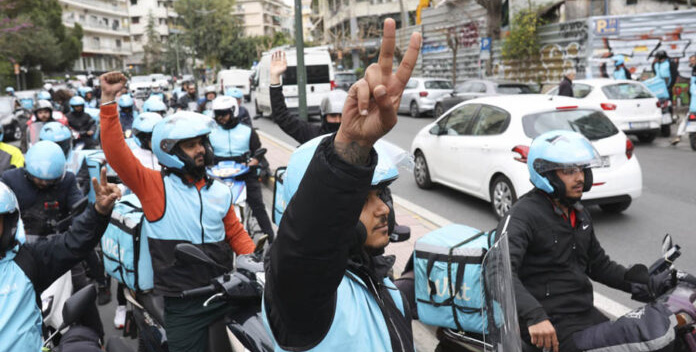After the successful strike actions of the Greek food delivery platform e-Food workers, it was the turn of the Wolt workers to hold strike actions and marches. They tried to expose the unacceptable exploitation regime that exists behind the fancy world delivery platforms try to present.
Wolt, according to company figures, currently employs more than 8,000 delivery workers and has around 10,000 pending applications from people who want to work for the company.
3,500 deliverers are employed in Athens alone, half of them belonging to contracting companies holding the catchy title ‘fleet managers’.
In a statement, the company claimed:
“Early 2023, WOLT upgraded its platform for all markets around the world. The fee calculation process is now carried out by an upgraded algorithm, which calculates criteria such as time, distance, accessibility to the merchant or customer and availability of distributors.”
This change in practice has led to pay cuts in all countries where Wolt operates, such as Finland, Georgia, Poland and Cyprus; an international wave of mobilisations emerged after this change.
Changing constantly the calculation algorithm used by the company makes it extremely difficult for workers to accurately check how their pay is distributed. At the same time, employment is handled more and more by subcontractors, who operate unregulated, with the company’s blessing, taking advantage of the fact that many of the workers are undocumented immigrants.
Xekinima, the Greek affiliate of Internationalist Standpoint, spoke with a Wolt worker, Arif Hangera, about the working conditions and workers’ mobilisations. Arif is a migrant from Pakistan and has been living in Greece for 21 years. He has been working for Wolt for the last 2 years.
ISp: Arif, what is the situation in Wolt today?
AH: Things are difficult. We have constant pay cuts per order. When Wolt started, the fee was close to 3€ per order. Then it went to 2.10, then to 1.75 and since last March to 1.45€.
Various bonuses were abolished such as the one for delivery in the case of rain, which was 1 euro per order, for working 8 to 11 in the evening, which was 0.40 euro and for working weekends, which was at 2.50 euro.
We have to pay for our equipment (helmets, shoes, raincoats etc.) ourselves. The cost for these is over 100 euros. We even pay for the advertising box that we put on our bikes which costs 200 euros.
Our colleagues who work for the contractors, the vast majority of whom are immigrants from Pakistan, Bangladesh, Afghanistan, Georgia, Albania, etc, are not insured and have to pay 25 to 30% of their wages to the contractor.
Those of us who are “freelancers” want the contractors to be abolished and the colleagues who work there to be hired as freelancers too, so that the bosses cannot divide us and we all have more work, insurance and better wages.
We demand that the fee for advertising and damage to the motorbike is increased for everyone to 0.50€ per order. It is currently 0.41€ for freelancers and 0.21€ for contractors.
Finally, we need to abolish the current customer rating scheme, because of which it only takes 2-3 complaints on a range of 8,000 orders to lose our work. Many of the complaints are racist, made against immigrant colleagues.
ISp: What was the participation and results of the workers’ strikes?
AH: The first strike was in 2020 with a rally at Syntagma square in Athens.
Another one followed in 2022, but the most important and massive one was the one we recently held on April 1-3, 2023.
The main demand was that the fee per order should not be further reduced.
Over 2,500 bikes participated in the motorcade we led to the company’s headquarters.
Picket teams went to the main shops and did not allow orders to be placed. The company had losses of millions of euros during these three days.
We had another strike on April 29-30 and on May 1st but they were not so well attended.
Our basic demands were not accepted. Only a limit of 1,000€ was put on the contractors’ wages and a 10% reduction of staff imposed, as a means to put a break at contractor work. This was the main reason for the migrants’ disagreement. As a result, they did not participate in the strike because they realised that they would not be able to work more hours to increase their income, because of the 1,000€ limit, 250 to 300 of which goes to the contractors. Many migrants have been working 10 and 12 hours in order to increase their salary and cover the contractor’s commission.
This is also a consequence of the divide and rule imposed on workers by the multinationals. We all have to face it united together with the unions of our area (the Attica Food and Tourism Trade Union, the Assembly of the rank-and-file Workers of the Bicycle Drivers and the Union of Self-employed Food Distributors of Attica).
Migrant colleagues who work in the contracting industry, like me, should not be afraid of being out of work because of the demands of the strike. The bosses in many places sort workers into old and new, hired or part-timers, in order to divide and exploit them.
We need to explain with a lot of patience and persistence that we must not allow any colleague, whether freelance or contractor, to be dismissed. What we are asking for is that everyone be hired by Wolt, so that all of us can have insurance, benefits and better pay. The contractors are only making a profit on the wage we should be getting from Wolt, since we work for them.
One conclusion I have come to over the years is that it is worth fighting, because otherwise there will be new wage cuts, uninsured work, workplace accidents, etc.



